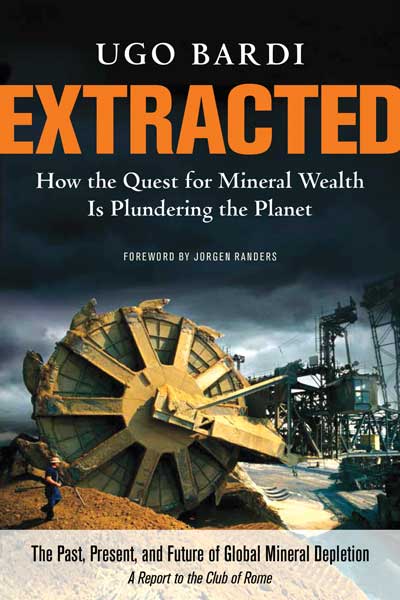 By Joseph Kirschke, News Editor-Mining
By Joseph Kirschke, News Editor-Mining
It was initially commissioned as a peer-reviewed report for the Club of Rome, an esteemed think tank boasting global leaders in academia, business, politics and science. Nonetheless, Ugo Bardi’s 304-page book, Extracted: How the Quest for Mineral Wealth is Plundering the Planet, (Chelsea Green Publishing, 2014) reads every bit like mainstream journalism—indeed, sometimes like a gripping novel.
And with good reason. After all, everyone has a stake in the longevity of the world’s minerals—and not least a mining community also at the epicenter of fast-evolving corporate social responsibility (CSR) and the environmental sustainability mandates that come with it. Yet, it’s also a topic ancient as it is easily forgotten—lost amid the daily grind of one of the most technologically intense, geographically challenging industries anywhere.
Bardi, a physical chemistry professor at the University of Florence, is pragmatic. He begins tens of thousands of years back when volcanoes, earthquakes and geysers fascinated while minerals yielded basic tools, before spawning vast wealth and greater empires. Today, he paints a darker, more transparent picture—an industrial revolution where pollution and waste from mining and energy-fueled chaos dominates much of Asia and the developing world.
Bardi uses a geology background to effect. His introduction of earth sciences is extremely readable for the most attention-depleted student—or miner, for that matter. A riveting analysis also emerges intertwining elements that have shaped humanity with pre-history to the Middle Ages to the present.
But as a member of Italy’s Association for the Study of Peak Oil and Gas (ASPO), Bardi strives to define the ultimate dilemma facing the modern mining industry—that mineral extraction uses 10% of global energy, only to increase over time as ore grades decrease. “No matter how large the amounts of minerals inside the earth’s crust, the problem lies in the amount of energy needed for extraction,” he wrote.
Energy, in other words, is at an unparalleled premium—with all its accompanying environmental damage and further resource depletion; Bardi, also co-author of the computer simulation-based Limits to Growth Revisited, (Donatella Meadows Institute, 1972) noted “that can’t be painless.”
Increasingly painful, too, has been the evolving intrusion of mining tragedies into the lives of non-miners in recent history—a driving force behind 21st century CSR and its cross-border awareness. Dire conditions of mine workers are a prelude to acutely hard-learned lessons like cyanide damage from California’s 1849 gold rush and the deaths of 116 Welsh school children and five teachers in a 1966 coal waste collapse.
But if “waste is the ultimate product of mining,” as the author reasoned, interests of miners wantonly square off against the scientific community, nongovernmental organizations (NGOs) and other stakeholders. Here, Bardi’s arguments blur: he neglects advanced CSR prioritization of local environments by mining companies—from post-mine remediation to pre-operational impact assessments.
These have a footprint and are part of a framework addressing resource depletion across borders. Bardi, accordingly, further ignores the emergence of public-private partnerships, like the United Nation’s Global Compact addressing long-term sustainability, along with other multi-stakeholder entities like the International Council on Mining and Metals (ICMM).
Other improvements in cooperative multi-stakeholder sustainability also go unmentioned. According to professional services firm KPMG, for instance, 100% of top Australian, Canadian, South African, U.S. and U.K. mining companies reported their company’s corporate governance practices in the past decade—the U.K.’s Modernizing Company Law being a prominent pioneer.
Miners and engineers more attuned to balance sheets and commodity cycles could be forgiven for dismissing Bardi’s extremely broad, holistic approach: Although his support for recycling and alternative energy sources—including solar power and hybrid automobiles—is noble, it also comes across tangential.
In addition, an audience more attuned to often enormous and nearly always intense mining operations will have little patience for apocalyptic projections of a post-hard commodity agricultural era. Still, with comprehensive facts, figures and charts, it’s undeniable—Bardi himself has performed due diligence.
Bardi more astutely gages an “energy efficiency” mindset within the mining community itself in a “third stage of grief” over environmental degradation. “This attitude,” he reported, “is accompanied by a remarkable faith in the power of science and technology.”
Just one way forward exists, though, according to the author: “Only if we arrive at acceptance can we progress to adapting to changes ahead,” he wrote. “We need to accept we cannot keep everything as it used to be in a world changing so deeply.”
Former Anglo American CEO Cynthia Carroll has been noted for this stance regarding CSR. “Growing demand and inevitable depletion of existing mines means Anglo will continue to invest for the long term,” Carroll told Executive Briefing.
Such needs are a wake-up call—and an opportunity for the majors, she added. “We are seeing host governments looking more toward the largest players to invest in their countries,” Carroll told the publication by advisory firm Critical Resource.
But the world at large is in a collective trap. It lies “between complementary resource depletion and ecosystem disruption—making us inhabitants of a planet that will have a different climate and be poorer in resources,” Bardi said, citing Jorgen Randers, 2052: A Global Forecast for the Next Forty Years, (Chelsea Green, 2012) as a case in point.
In the end, Bardi is no optimist about resource depletion, or climate change, at current rates. The result: “a planet where oceans are acid and polar ice caps have disappeared, where temperatures exterminate vertebrates, where acidification has destroyed marine life,” and, he added, “where ocean rise has swamped costal settlements.”
Moreover, outcomes for human life are “impossible” to say. “It may be a dark era is awaiting us,” he concluded, “the dark side of mining.”
To miners sustaining global industrial growth, such notions can seem remote as the harsh terrain in which they navigate. But they shouldn’t—the business itself and the planet on which it depends on are hanging in the balance.






